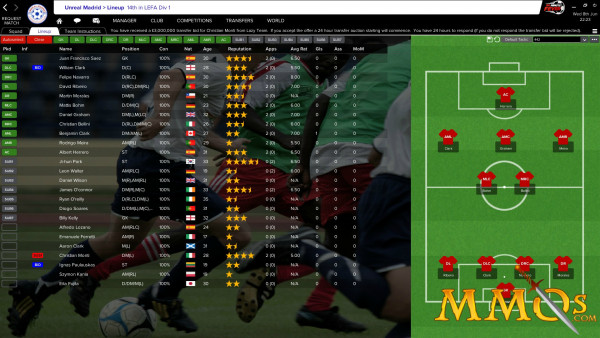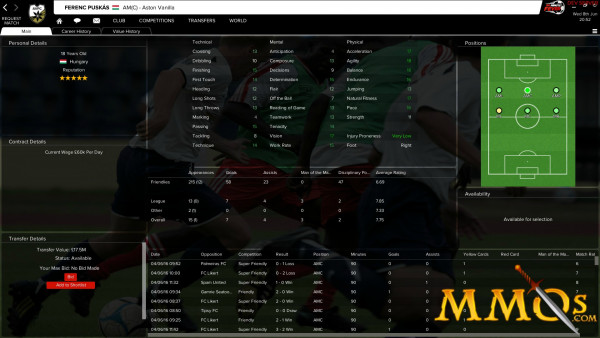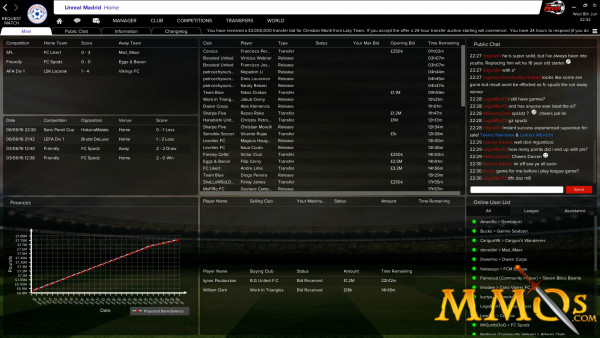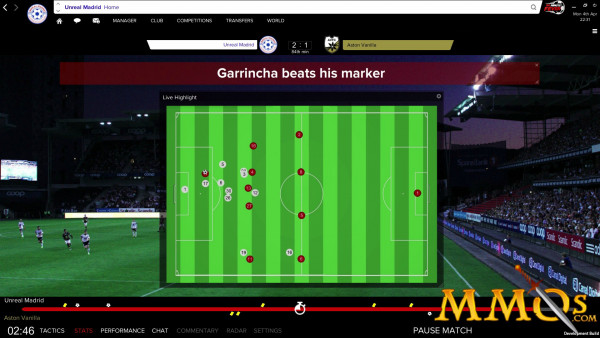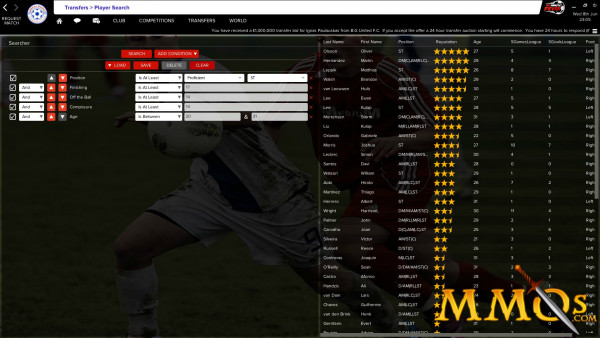Interview With Nick Kakoschke Of Isokron, Developers Of 90 Minute Fever

I recently had the chance to sit down with Nick Kakoschke of Isokron to discuss his company's recently released football management MMO, 90 Minute Fever. We discussed what inspired them to make the game, what's going to change over the course of Early Access, and more.
How many people are working on 90 Minute Fever?
We’ve got 11 people. It depends how you measure that exactly, but if you’re talking just full-time staff, 11. And then there are a few people involved that do bits of part-time, as well.
What inspired you to make the game originally?
There are quite a few people involved, obviously, and each individual had their own inspiration, but for myself—and I know others, as well—it was largely because we had previously played Football Manager Live.
When Football Manager Live finished, I know personally, I played that game quite a lot, you could say. When it finished, I desperately tried to find another game that was I wouldn’t say similar, but offered whatever it was that made Football Manager Live appealing—aside from being a great and deep game, I guess it was fundamentally different from other online football management games in that it really was sort of live, so to speak, and online and had a thriving community.
Those aspects, I basically couldn’t find in any other game. I tried and tried. I tried more than 30 online football management games and at the time, I was pretty desperate. I would have accepted something that was vastly inferior to Football Manager Live. I was very flexible, basically happy to pretty much accept anything, and, even willing to compromise massively, was still unable to find anything.
I found some people in a similar boat to myself, I guess, and I guess that’s where this project was born out of; trying to create the game that we wanted to find and didn’t exist. So I guess it’s kind of like you could double that up as we wanted this type of game, we couldn’t find it, and that obviously doubles up with the fact that there’s a market gap for that exists for that kind of game because it just wasn’t there.
I guess the inspiration for the game, you could argue, was the cancellation of Football Manager Live.
What are you looking to add and change over the course of Early Access? I saw that stadiums were going to be a thing. What else is planned?
Stadiums, yes, that’s one feature we intend to add. Sort of training and youth academies. Staff. Manager skills. All of these things will be added, but all of these things—at least on the list so far—they already exist to some degree, all of them, within the core game design and they already exist within the backend server-side code, if you like. What doesn’t exist for these things yet is the frontend implementation within the user client and, to a large degree, that’s completely intentional for us because we wanted to involve the Steam Early Access community in how all those features would work specifically.
Because from our degree, we understand basically how they should impact the game, how the balancing should work, how some of these things, like stadiums, for example, what the cost and benefit type balance should be, how it should impact things in the long term in terms of long-term revenue streams, how it impacts the overall economy of the game—we need to ensure there’s no inflation.
So in regards to the real things that actually matter from a game design perspective, if you’re talking about longevity, balance, not completely breaking the game—all of that work is already done. What hasn’t been done—in the case of stadiums is a good example, actually—is how that will just exist in the frontend to a user. And that’s because we want, essentially, the users to decide and we’re already talking about maybe how we’re going to do that.
Stadiums is a great example, actually. In Football Manager, basically, how stadiums work is that they exist and they do something, but they’re completely independently managed by your board, basically. You can put in a board request or something to maybe expand your stadium or something like that, but largely, it’s a non-game element, pretty much. It impacts the game in regards to your revenue streams, finances, and things like that, but you can’t, in Football Manager, for example, design your own stadium or decided to add an extra stand or a tier. At that high level, you can’t pick exactly how many corporate boxes or anything like that. You can’t pick basically anything. You can’t pick your ticket prices.
They’re quite high level things. If you go back to the ‘80s and early ‘90s, a lot of other games had the ability put in condiment stands and sell balloons to fans and things like that. And then a lot of other online football manager games, similar things like that exist today still in these other games. To do basically what you could deem as trivial things. Does it really matter whether you sell balloons or not? Or hotdogs? Or what the toilet facilities are like? Or the parking facilities, to a degree? That’s almost like a micromanagement mini-game on the side. Basically, if you just spend five minutes doing research, you can optimize your revenue for that match.
For us, that isn’t really the type of thing we want to do, to be honest. We’ve had a few users request it. When we get down to it and we get the consensus from everybody, I believe that the end result here will be that they want customization, they want to be able to decide how many stands they have in their stadium and how many tiers they have in each one and sort of like appetizing sponsorship deals and maybe ticket prices, but I believe that’s the level it’s going to exist in this game. I don’t think we’re going to go down the mini-game approach that exists in some other games.
Essentially, we can take any of those elements that I’ve just described—whichever are the ones that people actually want—and we can implement them into the game. We basically know the backend, in regards to the game balance, essentially what the revenue stream should be from a stadium and that’s exactly how that is specifically created. It’s quite flexible.
So you’re going to look to give them maybe a little bit of customization where it really matters and maybe give them the ability to increase their revenue just a little bit, but nothing too specific?
I believe so. Everybody wants something different and this will be no different. I believe that that’s probably what the case will be. I think, for sure, that if we have any sort of element of proper micromanagement that exists here, we will also have to have the option that basically, somebody can just check a box and have the game do it for them. That they can just completely bypass that if they want. Like “automatically set ticket prices for me” checkbox kind of thing.
Would the automatic thing possibly play into the staff, like you hire staff to do it for you, or would that just be a checkbox for anyone?
“Possibly” is the answer. I believe it would be a checkbox for anybody, but there’s possibility scope here for lots of things. For example, you could have staff that do it slightly more optimal.
How did you choose the more-than-50 attributes that each player has?
Like I said, this was pretty much born out of the demise of Football Manager Live. One of the very first things when we were talking about it, a group of us were discussing why it failed, which then lead into at the same time, I was trying to find another game to play, and then, at the same time, the inevitable conclusion that I’m sure a lot of people reached at the time that they decided that they wanted to make their own game like that. The only thing that exists in Football Manager and Football Manager Live that we didn’t know that we could do—given the time and the resources, we knew that we could build the whole entire game, except for one thing—was the match simulator.
I guess, in many ways, that was the logical place to start, because if we couldn’t overcome that hurdle, the whole project was pretty a no-go in our opinion at the time. Retrospectively, I believe we actually made an incorrect decision there. I believe it is possible without a match simulator like that because we’ve already proven that it is.
At the time, that was the key stumbling block, so the very first thing that we did was got somebody involved that knew a lot about AI. And then myself, I went away and studied AI for about a year, as well. From that point, we basically sat down and worked out, at a theoretical level, exactly how all of the AI would work and how basically, we could build the whole match simulator. And then making sure we essentially had that conversation in the pub on Sundays, our weekly four hour session, with a couple other people who didn’t know about AI, but knew a lot about football, and essentially talking it through. How watching something in football, somebody does something, what have they done there, how would you actually code that? From there, it sort of stemmed to building the AI and how it looked from a blank canvas, designing it. So it had the attributes born out of that from the ground up.
I mean there’s a logical set of attributes that are going to exist in any game, like passing and tackling and whatever, which is a big deal of them, but then there are a lot of attributes that aren’t so obvious. For example, one of our hidden attributes —and we had never seen it anywhere before and it’s quite surprising in many ways because it’s actually one of the most important skills in football today—is play acting, the ability to pretend to dive to win a free kick or whatever. We had never seen that exist as an attribute or a concept in any other computer game before and yet, in real world football, it’s a key skill, basically. As much as we don’t like personally ourselves that football has taken that direction over the last 20 years, there’s no denying the fact that it’s an absolutely key skill for a player to have in football today, so that exists in our game as one of the hidden attributes.
What made you decide to go with the subscription model, other than the fact that it’s not associated with pay-to-win?
That is one of the key reasons. I don’t think that can be understated. We really wanted to divorce ourselves in as many ways as possible from pay-to-win. That’s also, for example, one of the key reasons why our game is client-based. Even though we would have a much greater reach or audience if our game was browser-based and even though, at a technical level, our client could be browser-based, it was a conscious decision to not make it browser-based. To divorce it from pay-to-win games. Being on Steam, having a proper game client, and the monthly subscription play into that.
But separate from that, there are other reasons for the monthly subscription model. The first one to point out is because, from our Alpha testers, the people who had been testing the game for the seven months leading up to when we launched, the overwhelming majority of people wanted that to be the monetization for the game. That’s what the users wanted. And I appreciate that, with our testers, it’s a little bit flipped because they’re playing the game first, understanding that they enjoy it, and then deciding how they would want to have it monetized after whereas obviously, the people that we have to attract as new customers, we don’t get that benefit of having had them play our game for six months already before being happy to do that.
But I know the reasons essentially why they want to have it as a monthly subscription and it all revolves around having confidence in the fact that the game will continue to exist, basically, without ever having pay-to-win features. That, as a concept, can’t be understated. It’s a key sales point for us. It’s a key sales point for a reason. I can tell you right now that if we implemented a single pay-to-win feature, we would lose over half our user base overnight. The vast majority of our users, they do not play any other online football management games because they can’t stand them, basically. They find them infuriating, they find them frustrating, and they just don’t like pay-to-win games at all.
From our perspective, there are other key things. It means that we don’t have to have hundreds of thousands of users. We don’t even have to have tens of thousands of users for this game to be economically viable, to last forever. We only need a very modest user size to have a viable project that would continue to last and continue to be improved forever if it’s monthly subscription-based.
How are you planning to support the game post-release in terms of content updates?
This is another reason for the monthly subscription model, to be honest. It’s just the perfect marrying of objectives for ourselves and our users. With the monthly subscription, we basically have both the means and the incentive to continuously improve the game forever. That’s what it comes down to. If you’re making money in the way we will have had to have done it to make money, which is by having an enjoyable game that has depth, has a lot of gameplay, and has very happy users, it would just make complete sense, from a business standpoint, to want to continue to improve it to get more users to make more money. It’s just not logical that you would want to stop adding features. It doesn’t make any sense, from our perspective. From the users’ perspectives, they know that that’s the case for us. They know that they will continue to have a game that’s really well supported, that’s always having new enhancements, features, and improvements.
If you look at any successful MMO that is still running today, which isn’t really that many of them, they’re all continually adding content. They didn’t just stop. If you have a monthly subscription-based MMO and they stop improving it, I believe that the end is nigh.
--
You can purchase a subscription for 90 Minute Fever now via Steam.
